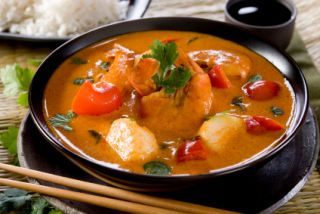Antioxidant
You Want Multivitamins? Here, Eat This.
Easy, tasty, and so much more convivial than a pill
Posted October 21, 2012

In my last post I boasted that I would give you a recipe that would put any multivitamin pill to shame; here it is.
This may be the most nutrient-dense, vitamin-packed, mineral-rich, cancer-protective recipe I know. Not to mention that it's incomparably more life-affirming to gather around a pot of stew with your friends or family than to pop a multi...
So, let's take a look at all the goodies in this dish.
First, this fish stew contains salmon, which is a great source of omega-3 fatty acids and easy-to-digest protein. Omega-3s have a wide range of anti-cancer properties: among others, they can decrease free radicals (antioxidant), bolster the immune system, inhibit the production of blood vessels that feed tumors, inhibit tumor cell progression, enhance the effects of certain types of chemotherapy and radiation treatments, slow tumor growth and reduce the risk of wasting (cachexia) in cancer patients.
Most of us don’t get nearly enough omega-3s from our diet, so eating oily fish like salmon (or sardines, herring, mackerel, anchovies and sablefish) at least once a week (preferably 2-3 times) is a great idea.
Next, this stew features oodles of healthy herbs and spices – turmeric, ginger, garlic, coriander, cardamom, cilantro – whose benefits include antioxidant, detoxifying, anti-inflammatory, immune-boosting, anti-nausea (ginger) and anti-tumor effects.
Further, this dish is a great vehicle for vegetables: mushrooms with their many anti-cancer effects, carotenoid-rich peppers and carrots that protect our cells form oxidation and boost our immune system, broccoli with its detoxifying and tumor-blocking effects, leeks and onions whose sulphur compounds and flavonoids boost the immune system, prevent free-radical damage, tumor growth and the formation of cancer-causing agents.
Lastly, coconut fat is made up to 2/3 of medium-chain triglycerides that are thought to suppress fat deposition and encourage the body to burn fat. Medium-chain triglycerides also appear to support insulin sensitivity, even in patients with type2 diabetes, a condition that is usually characterized by insulin resistance (1). Heightened insulin sensitivity is a good thing because it means that the body secretes less insulin to regulate blood glucose. This is important in the context of cancer as insulin and its close cousin, insulin-like growth factor-1, promote the growth and spread of cancer cells.
Coconut milk also contains caprylic acid which has powerful anti-fungal properties. Moreover, creamy coconut milk makes this stew so fragrant and satiating that you may even want to pass on that sugary dessert…
Salmon And Vegetable Curry (watch me preparing this here)
This quick and easy fish stew takes us to Thailand without having to buy hard-to-find ingredients such as lemongrass, curry leaves or galangal. You can substitute the fish with sliced chicken breast or edamame beans – or combine these.
Use any vegetables that are in season: leeks, carrots, broccoli, cabbage, shiitake mushrooms (fresh or dried) and onions in winter; asparagus, peas or fava beans in springtime; green beans, peppers, snow peas, zucchini, eggplant or cherry tomatoes in summer. Turmeric and curry, garlic, ginger, onion, and the omega-3 fats in the salmon provide a range of anti-inflammatory and anti-cancer compounds. (Serves 4-6). Serve with basmati rice or – even more anti-inflammatory – cauliflower rice.
Ingredients
3-4 fresh salmon fillets (about 5-6 oz / 150g per person), skinless, boneless (remove any remaining bones with tweezers), cut into cubes of about 1 x 1 inch / 2 x 2 cm
2 tbsp coconut oil
1 onion, minced
2 cloves garlic, finely chopped
1 tbsp grated fresh ginger
1 tsp curry powder
1 tsp turmeric (freshly grated, or dried and ground)
1 tsp ground coriander
½ tsp cardamom powder
pinch of pepper flakes of chilli powder
1 large leek, washed (make sure you rinse out any grit beneath the top leaves) and sliced
2 carrots, peeled and thinly sliced
1 head broccoli, separated into small florets
finely grated zest of half a lemon, a few drops of lemon juice
2 cups / 500ml fish or vegetable stock
400/1¾ cups coconut milk (or reconstituted creamed coconut)
salt, black pepper
2 tbsp chopped fresh cilantro (coriander)
a few squirts of Thai fish sauce
In a large, heavy-bottomed pot, cook onion in oil until translucent (4-5 minutes), add garlic and ginger and cook another minute, stirring. Add spices and stir one minute more.
Add carrots and stock, cover and simmer for 5 minutes. Then add leeks and broccoli florets and simmer 5-6 minutes until vegetables begin to soften. (The more finely you chop the vegetables, the faster they will soften, and the more nutrients will be preserved.)
Stir in coconut milk and remove from heat. Your soup base is ready (you can prepare this several hours in advance; better still, why not make a double batch and freeze half of it for later).
When you are ready to eat, bring soup base to a boil, add finely grated lemon zest and season to taste with salt, pepper and lemon juice. Immerse the fish cubes and allow them to cook on low heat for 3-4 minutes without stirring. (If using chicken or duck, cut into thin slices and cook in the soup for about 5 minutes).
Sprinkle with chopped cilantro and serve immediately. As an accompaniment, serve with steamed basmati rice, boiled quinoa or cauliflower “rice”.
Reference
Koji Nagao, Teruyoshi Yanagita. Medium-chain fatty acids: Functional lipids for the prevention and treatment of the metabolic syndrome. Pharmacological Research, Volume 61, Issue 3, March 2010, Pages 208-212




